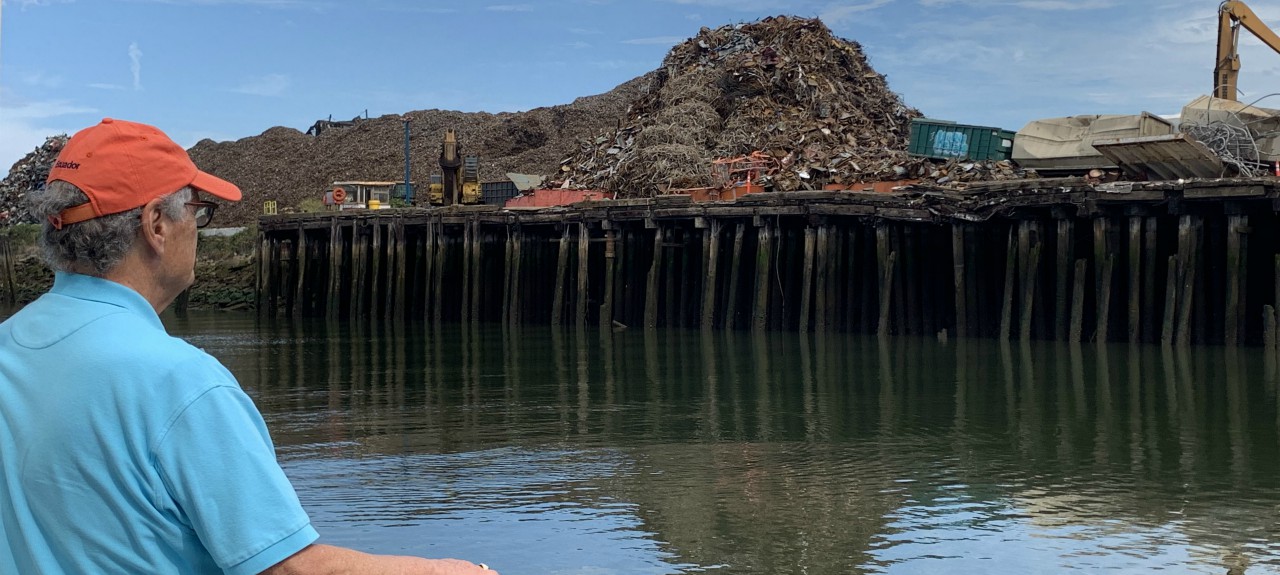A boat tour reveals a difficult history with lasting consequences. What are we doing about them?
By Elizabeth List, Senior Philanthropic Advisor
When you enter the mouth of the Duwamish River, you immediately start to hear the sound of cranes lifting piles of scrap metal onto piles of more scrap metal. Fishermen standing along the river’s banks cast their rods, despite public notices around the high level of contamination found in the fish there. Trucks barrel over the West Seattle Bridge, drowning out any sound of the water. Instead of tide flats or marshes at the water’s edge, row after row of unmarked, one-story buildings perch alongside giant shipping containers.
On a sunny Thursday afternoon in late August, Seattle Foundation hosted a boat tour for our philanthropic partners and staff from Puget Soundkeeper and Duwamish River Cleanup Coalition. Some 30 of us boarded the Admiral Jack for a trip up the river to see and hear firsthand the impacts pollution and climate change have had on Seattle’s industrialized estuary and the people who live and work nearby. Through our work around our Climate Justice Impact Strategy, Seattle Foundation is raising awareness of climate change’s disproportionate impacts on communities of color.
As we cruised by metal and debris, Paulina Lopez from Duwamish River Cleanup Coalition shared the history of the Duwamish, where Native Americans lived for millennia before they were displaced by industrialists who used the river to dispose of waste.
The first residents of what is now South Seattle were the Duwamish people. For thousands of years, they harvested fish and clams from the river, grew crops and lived off the land. When the first European Americans arrived in 1851, the Duwamish occupied at least 17 villages, with more than 90 longhouses along Elliott Bay, the Duwamish River, Lake Washington, Lake Union and Lake Sammamish. In 1913, the Duwamish River was excavated and dredged, and within a few years, it was transformed into a five-mile waterway that enabled a century of development in Seattle’s commercial district.
The Duwamish River has been a catalyst for innovation in Seattle, but with dire consequences. In 2001 the Environmental Protection Agency declared the Duwamish a Superfund site, recognizing it as one of the most contaminated places in the country. Among the many toxic chemicals found in the river is polychlorinated biphenyls, more commonly known as PCBs, and people are exposed to them when they eat resident fish or shellfish or when they come into contact with contaminated sediment. In addition to the toxins found in the river itself, a combination of construction-related activities and rail and truck traffic has significantly increased air pollution in the area.
What has this meant for the communities living alongside the Duwamish? The Duwamish Valley Cumulative Health Impacts Analysis showed that people who live in the Duwamish Valley have a 13-year shorter life expectancy than residents of North Seattle, as well as higher mortality from lung cancer, more hospitalizations for children with asthma, and higher rates of diabetes and cardiovascular disease. More Duwamish Valley residents also lack health insurance, compared to King County as a whole.
“I was struck by the human impact on the river; a vivid demonstration of disparity,” SeaFdn board member Steve Hill told me after the tour.
The Duwamish River corridor is not an anomaly. Research makes clear that low-income communities and communities of color are hit first and worst by climate change and pollution. That’s why organizations like Duwamish River Cleanup Coalition and Puget Soundkeeper have partnered over the years to create policy, enforce pollution permits and educate citizens about best practices to reduce the impact of stormwater pollution. They have engaged community and inspired youth to get involved with cleanup efforts and advocacy.
SeaFdn is also working to achieve climate justice, directing attention and resources to the organizations working to address climate change and social justice. We also actively invest in research, advocacy and policy, convening and coalition-building, storytelling and direct interventions on the ground. We are creating opportunities, like the boat tour on the Duwamish, where philanthropists can learn about and engage in these issues. We are currently raising $250,000 to match a challenge grant from a Seattle Foundation philanthropist, which, when met, will make another $500,000 total available for work in this arena.
“This is an environmental effort that feels different,” Hill said. “It’s more than preservation; it’s human impact as well.”
To learn more about how you can support Climate Justice, contribute to the challenge grant and help communities who are hit first and worst by climate change, please contact your Philanthropic Advisor or Sally Gillis, Managing Director of Strategic Impact & Partnerships.
Other Recommended Resources
Join Puget Soundkeeper on a patrol tour of the Duwamish River
Write to your local elected officials to support the Duwamish River cleanup
Join the Duwamish Alive Coalition for a restoration event
Get to know the Duwamish River Cleanup Coalition through its community engagement opportunities

